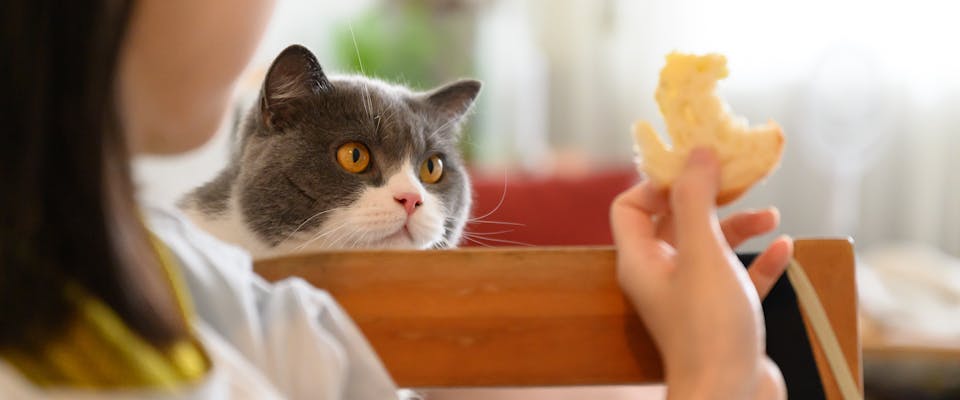Can Cats Eat Bread (With Images)
Although technically permissible (Can Cats Eat Bread), eating bread is not a part of a cat’s natural or required diet. Cats are obligate carnivores, which means they need a diet high in animal-based protein.
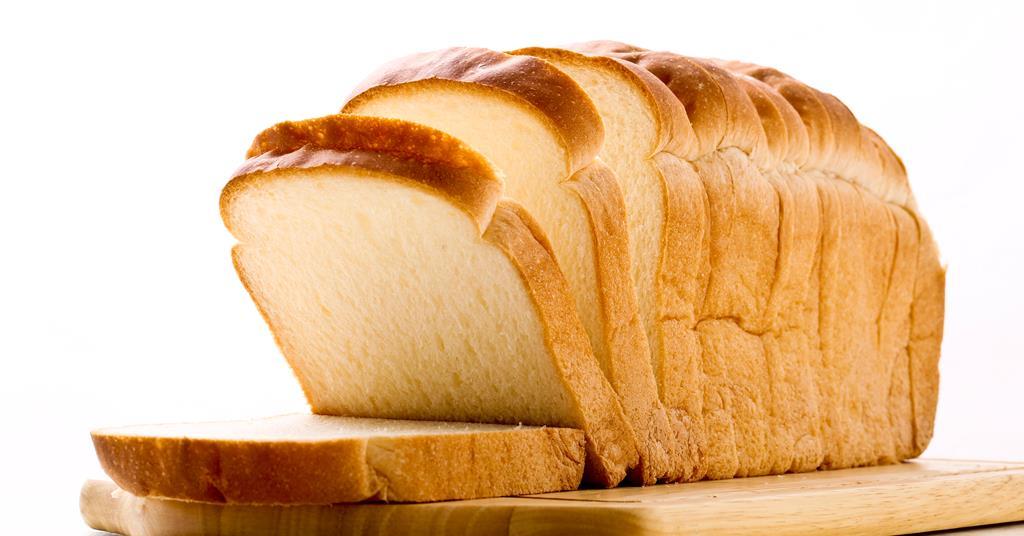
Bread contains few of the nutrients that cats require to flourish and is strong in carbohydrates. A cat may not be harmed by a tiny bit of bread, but it shouldn’t be a frequent part of its diet.
It is best to follow a diet designed especially for cats, such as premium cat food, to make sure they are receiving all the nutrients they require.

What kind of bread can cats eat?
Cats are obligate carnivores, which means that they need a diet that is mostly made up of animal-based protein, as I indicated previously. Bread, which is high in carbohydrates and low in the nutrients that cats require to flourish, is not a food that cats naturally need.
A cat may not be harmed by a tiny bit of bread, but it shouldn’t be a frequent part of its diet. In order to make sure that cats are getting all the nutrients they require, it is often preferable to stick to a diet designed especially for cats, such as premium cat food.
Can cats eat bread with milk?
Can Ccts eat bread with milk, although it is not a natural or essential element of their diet? A cat may not be harmed by a modest bit of bread and milk, but it shouldn’t be a regular part of its diet.
In addition, a lot of cats struggle to digest the sugar lactose, which is present in milk and other dairy products, due to their lactose intolerance. Therefore, eating bread and milk together may irritate your stomach and result in gas or diarrhea.
It is best to follow a diet designed especially for cats, such as premium cat food, to make sure they are receiving all the nutrients they require.
Can Felines eat bread and butter?
A cat’s diet does not naturally needs to include bread and butter. Due to their obligatory carnivorous nature, cats must consume a diet that is mostly made up of animal-based protein rather than carbs.
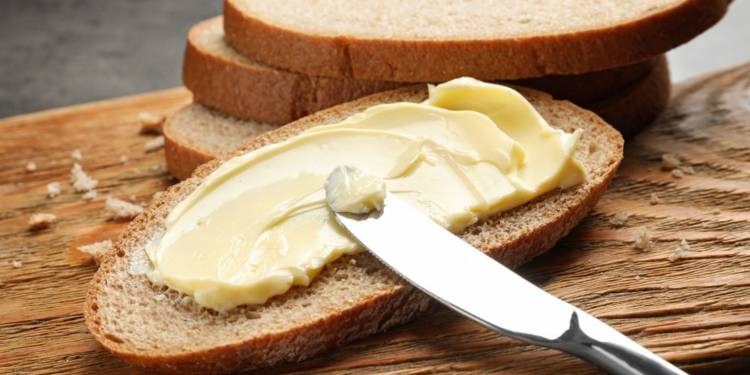
A cat may not be harmed by a modest bit of bread and butter, but it shouldn’t be a frequent part of its diet. Butter and bread are high in calories but lacking in the vital components cats require to flourish.
Can Felines Eat crusts?
Although theoretically permissible, eating bread crust is neither a natural nor essential element of a cat’s diet.
A cat may not be harmed by a tiny quantity of bread crust, but it shouldn’t be a frequent part of its diet. The bread crust is low in the vital nutrients that cats require to grow and heavy in carbohydrates.
Furthermore, if the cat has a difficult time chewing it, the hardness of the bread crust could lead to dental issues.
Can cats eat bread crumbs?
The regular feeding of bread crumbs to cats should be avoided because they are not a natural or necessary component of a cat’s diet. Additionally, if cats ingest bread crumbs without eating them properly, they could suffocate and become a choking hazard.

Additionally, it’s critical to remember that cats shouldn’t ever be fed table scraps, including bread crumbs or any other human food, as doing so might harm their health and alter their normal eating patterns.
How much bread can a cat eat daily?
Cats shouldn’t consume bread on a regular basis because it is neither natural nor necessary for a cat’s diet. A cat may not be harmed by a tiny bit of bread, but it shouldn’t be a frequent part of its diet.
It is best to follow a diet designed especially for cats, such as premium cat food, to make sure they are receiving all the nutrients they require. Feeding cats bread can lead to weight gain, dental issues, and digestive disturbances like gas and diarrhea.

Why does my cat like eating bread?
Cats are unique creatures with individual interests and preferences. While some cats could be drawn to the aroma or flavor of the bread, others might not care at all.
Additionally, because bread is made of grains, which are a source of carbohydrates that cats need for energy, cats may be drawn to it. As a result, it’s conceivable that your cat like eating bread since it provides energy.
Can cats eat bread and cheese?
Cheese is high in fat and salt, which may upset a cat’s stomach and result in obesity if ingested in big quantities. Bread is high in carbohydrates and poor in vital elements that cats require.
Additionally, a lot of cats struggle to digest the sugar lactose, which is present in milk and other dairy products like cheese, because they are lactose intolerant. Therefore, eating bread and cheese may irritate your stomach and result in gas or diarrhea.
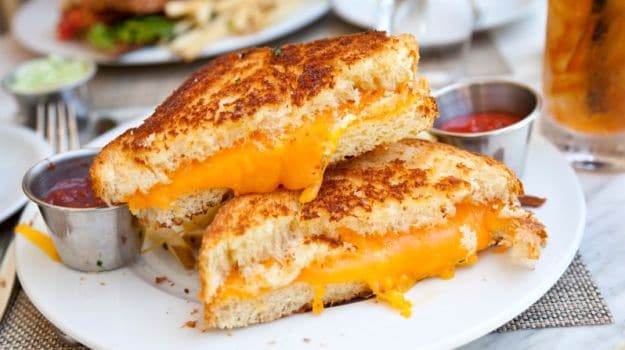
Can cats eat bread and peanut butter?
Peanut butter is usually safe for cats to eat, but it has a lot of fat, which can make their stomachs upset if they eat too much. Also, some cats may be allergic to peanuts, so it’s best to give them a small amount first to see if they have any problems.
Also, it’s important to know that some peanut butter products contain xylitol, which is poisonous to cats. It can cause insulin to be released quickly, which can cause low blood sugar or liver failure. So, you should check the list of ingredients before giving peanut butter to your cat.
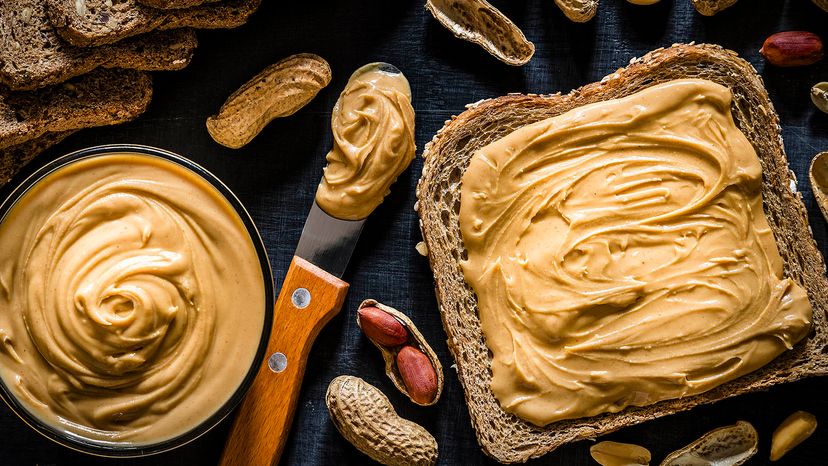
Can cats eat honey wheat bread?
Cats have to eat meat because they are “obligate carnivores.” This means that most of their food should come from animal protein, not carbs. Even though a small amount of honey wheat bread might not hurt a cat, they shouldn’t eat it every day.
It’s also important to remember that cats should never be fed table scraps, like honey wheat bread or any other human food. This can cause health problems and mess up their natural eating habits.
Is bread harmful to cats?
Cats can consume bread in tiny amounts as a treat sometimes because it is not toxic to them. It can be high in carbs and lacking in the key elements that cats require, and it is not a natural or necessary component of a cat’s diet.
Additionally, a lot of cats struggle to digest the sugar lactose, which is present in milk and other dairy products like cheese, because they are lactose intolerant. Therefore, eating bread may irritate your stomach and result in gas or diarrhea.
It is best to follow a diet designed especially for cats, such as premium cat food, to make sure they are receiving all the nutrients they require.
Additionally, it’s crucial to remember that cats shouldn’t ever be offered table scraps, including bread or any other human food, as this might harm their health and alter their normal eating patterns.
How to feed bread to your cat
It’s recommended to give your cat bread as a treat sparingly and as a little portion of their regular diet. The following advice will help you feed bread to your cat:
1. Start off with little portions. Give your cat a pea-sized piece of bread to watch how they react. If they don’t react negatively, you can progressively up the dosage over time.
2. Steer clear of butter and other spreads since cats have trouble digesting the sugar lactose, which is present in milk and other dairy products like cheese. Cats are also lactose intolerant. On the bread, stay away from spreading butter or any other dairy products.
3. Avoid bread that has additional elements that can make cats sick. Some breeds have substances like garlic or onions that might make cats sick. Read the ingredient label carefully and steer clear of any bread that has these substances.
4. Avoid giving your cat moldy bread. Bread can easily get moldy, so make sure to examine it first. It is best to throw out moldy bread because it might be harmful to your health.
5. Don’t go overboard: Cats should only occasionally have bread as a treat rather than as a regular element of their diet. Overfeeding your cat’s bread can have negative health effects and change their normal eating patterns.
6. Follow a diet designed exclusively for cats. Cats need a diet high in animal-based protein and low in carbs. It is best to follow a diet designed especially for cats, such as premium cat food, to make sure they are receiving all the nutrients they require.

